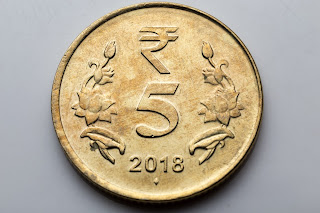Meaning of central bank.
Central bank is the Apex financial institution of an economy which controls, regulates and manges the monetary and credit policy of the economy.
Function of central bank.
1. Bank of Note issue :-
The central bank has got the Monopoly right of issuing currency notes in order to have full control over volume of currency and credit . It has to keep a reserve in the form of gold, foreign exchange, government securities and foreign securities.
In India Reserve bank of India (RBI) issue currency notes from 2 and above. The system which is adopted by RBI is called Minimum reserve system . One rupee note and coin are issued by ministry of finance of central government.
The central bank also issue new note for the government when there is deficit in government budget. This is called deficit financing .
2. Banker to the government:-
The central bank act as a banker to both central and state government. Government keep their cash balance in current account with the central bank . The central bank gives loan and advance to the government for a short period of time as and when necessary . It accept all kind of receipt and make payment on behalf of the government. It also managed public debt .
It represents the government in the international meeting and seminar, on financial matters . Central Bank also give advice to government on monetary banking and financial matters.
The central bank also issue new note for the government when there is deficit in government budget. This is called deficit financing .
2. Banker to the government:-
The central bank act as a banker to both central and state government. Government keep their cash balance in current account with the central bank . The central bank gives loan and advance to the government for a short period of time as and when necessary . It accept all kind of receipt and make payment on behalf of the government. It also managed public debt .
It represents the government in the international meeting and seminar, on financial matters . Central Bank also give advice to government on monetary banking and financial matters.
3. Bankers bank:-
The central bank act as a bankers bank in the following ground:-
. Custodian of cash reserve: It act as a custodian of cash reserve of all commercial bank . All the banks of the country are required to keep a minimum percentage of their deposit with the central bank in cash form . That is why the central bank is the ultimate holder of cash reserve of commercial bank.
. Lenders of last resort: when commercial bank failed to Meet their financial requirement from the other sources then they approach to central bank which provides them loan and advance as a lenders of the last resort . This save commercial banks from possible breakdown.
. Clearing house: It act as a clearing House of clearnce . The central bank keep the cash balance of all commercial bank. Hence it is easier for all commercial bank to adjust their claim against each other in the book of central bank . This system of clearing House facilitates transfer of fund quickly, safely, and at low cost.
4. Custodian of foreign exchange:-
The central bank is custodian of foreign currency and gold. All receipts and payment in foreign exchange are made by the central bank . It keeps a close watch on external value of it's currency and conduct exchange management control.
5. Control of money and credit supply: The central bank controls credit and money Supply through its monetary policy . The instrument used by the central bank for the same are bank rate, repo rate, open market operation, legal reserve, ratio margins requirement etc.
******
Also read,.
Contract of guarantees, meaning,Examples,types,,parties involved. › Contract of guarantees Meaning According to sec.126 of Indian contract act 1872"A contract of guarantee is a contract to perform ...
Contract of indemnity, Meaning,Example, Parties and their rights › Contract of indemnity. Meaning Contract of indemnity defined under section 124 of Indian contact act 1872. That is " A contract b...

Comments
Post a Comment